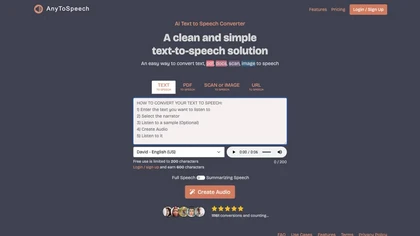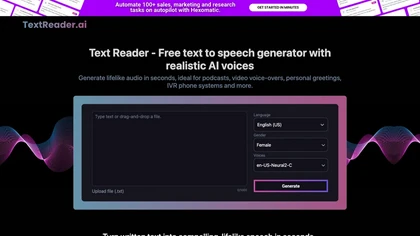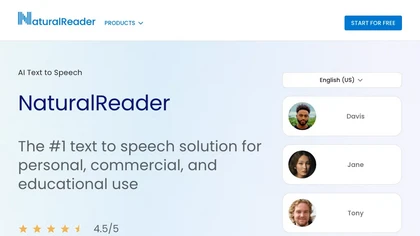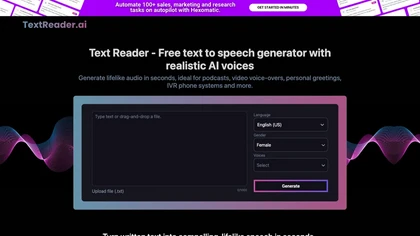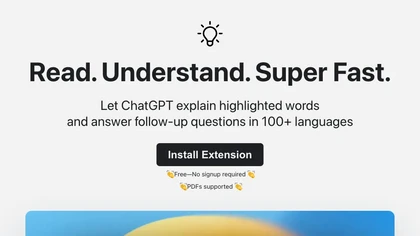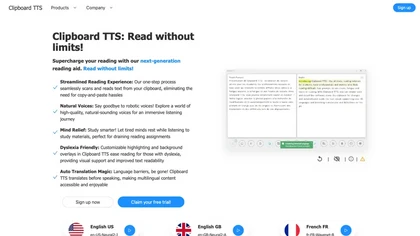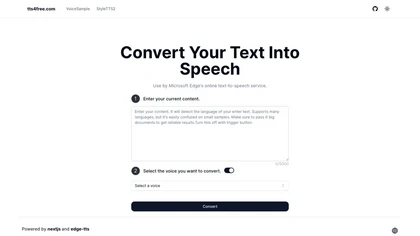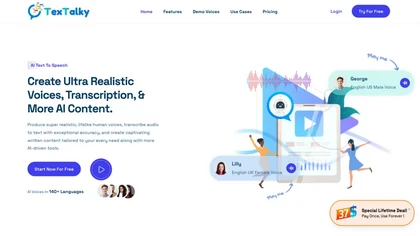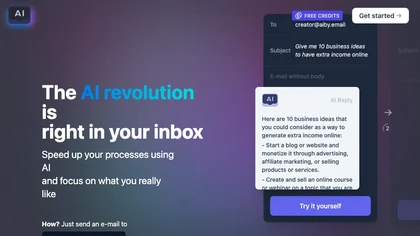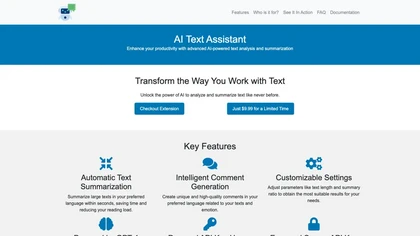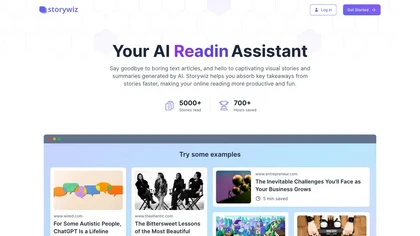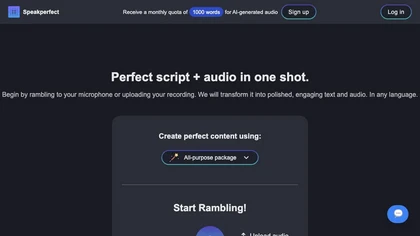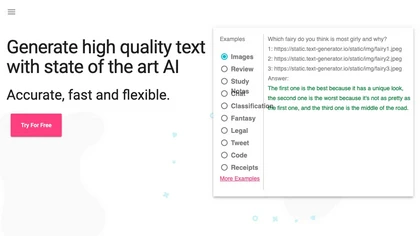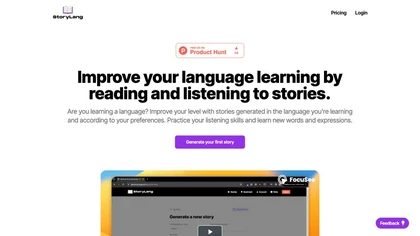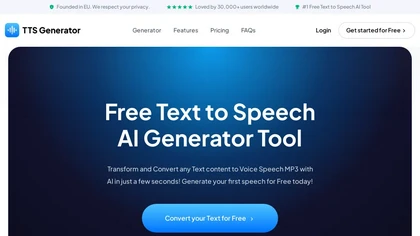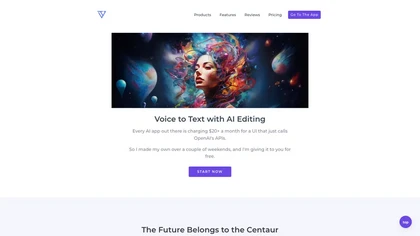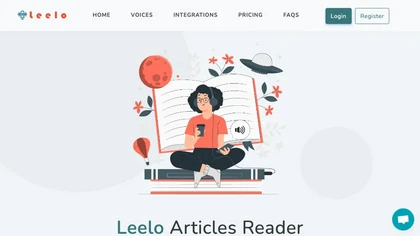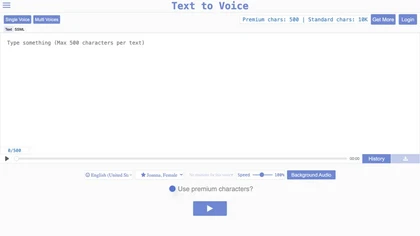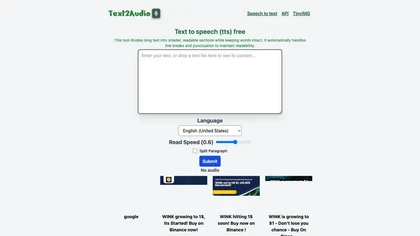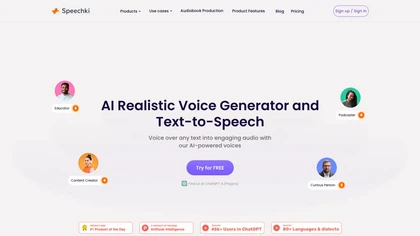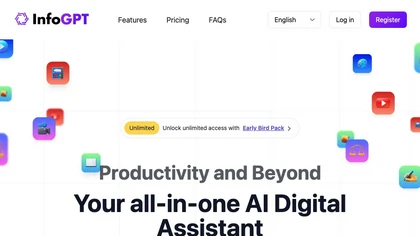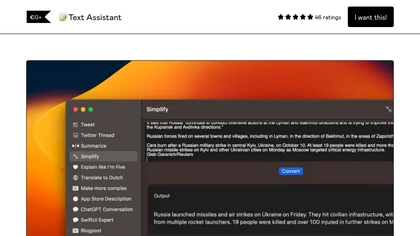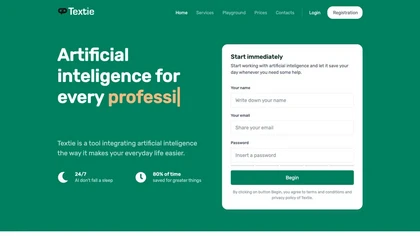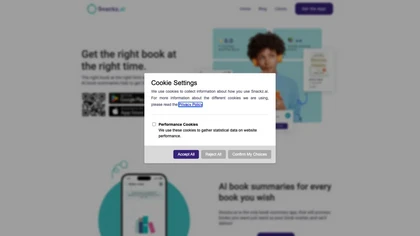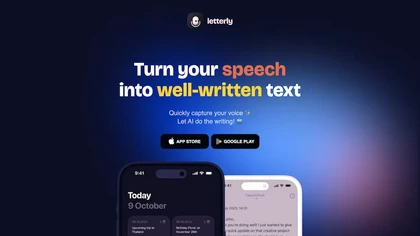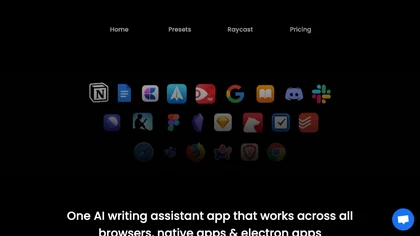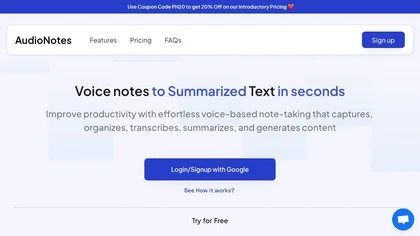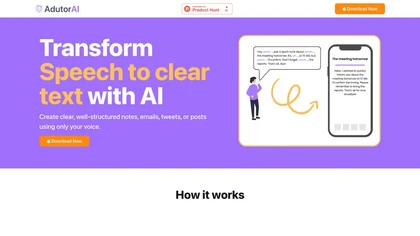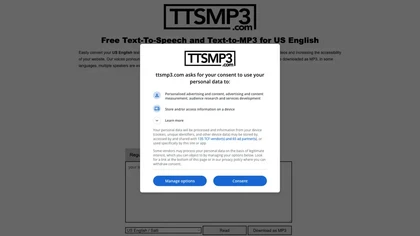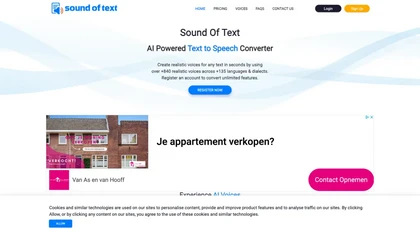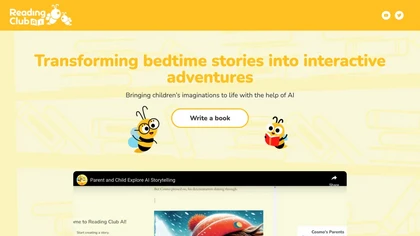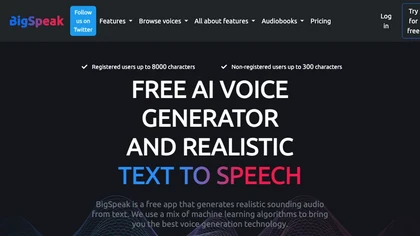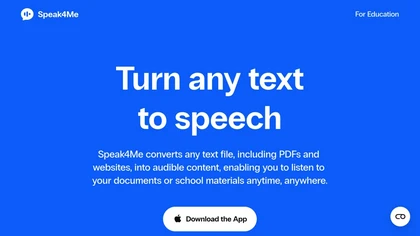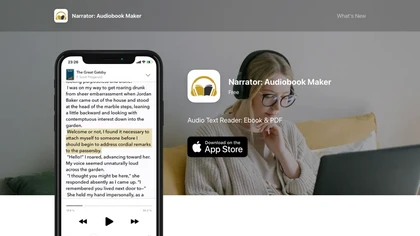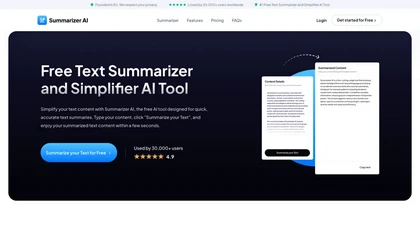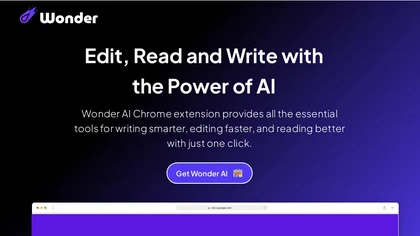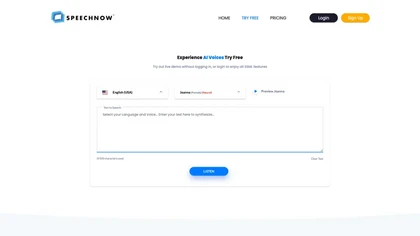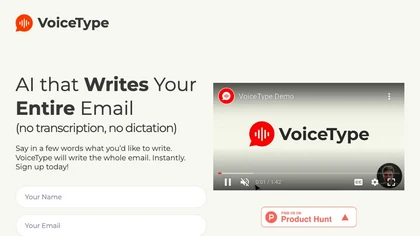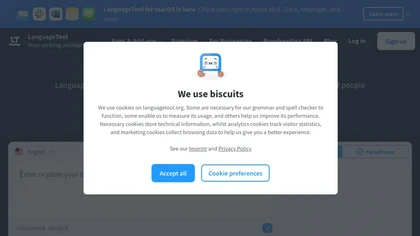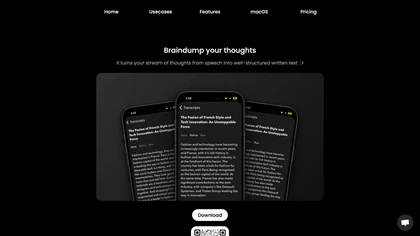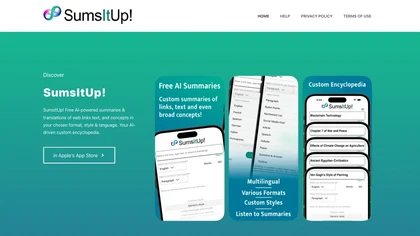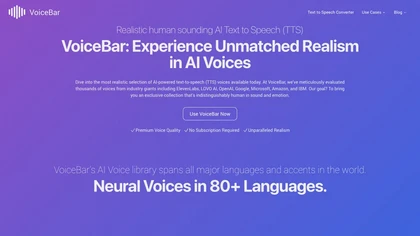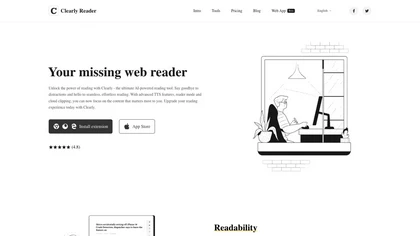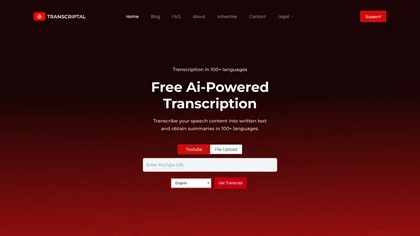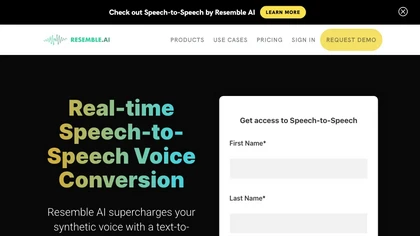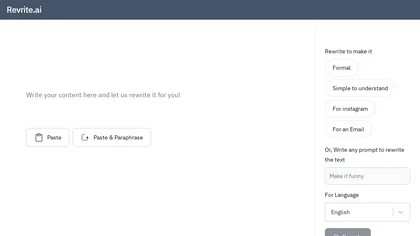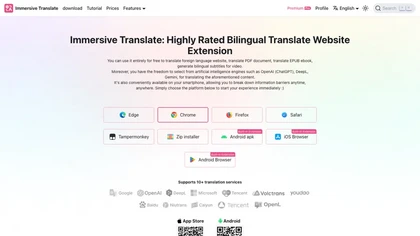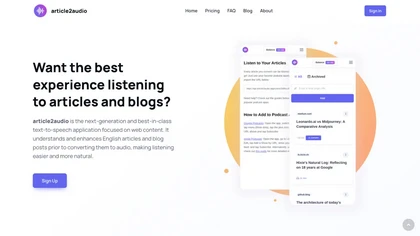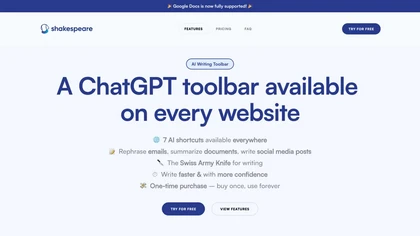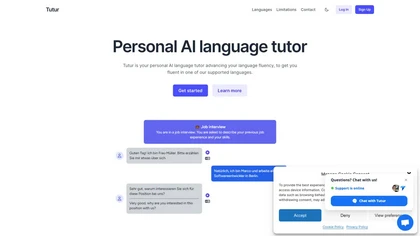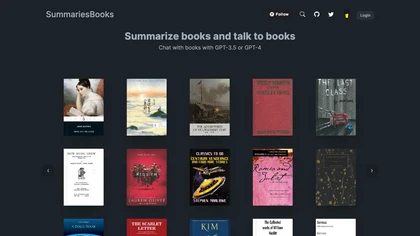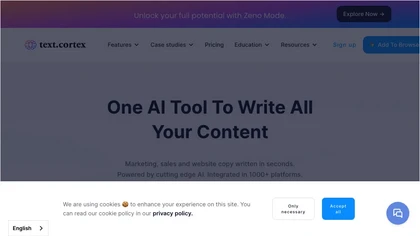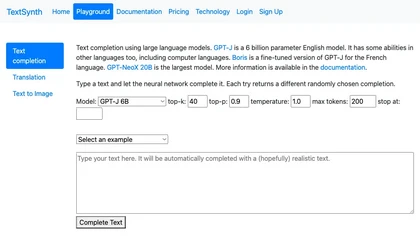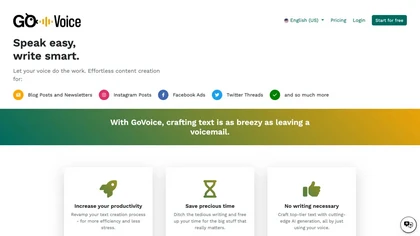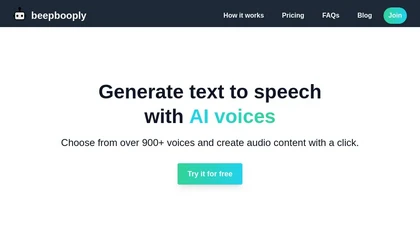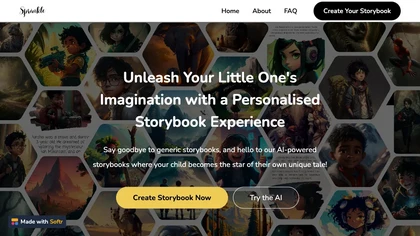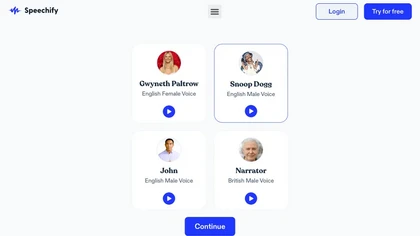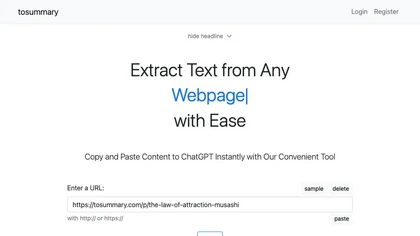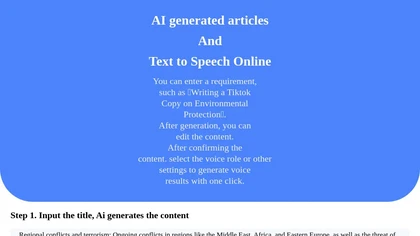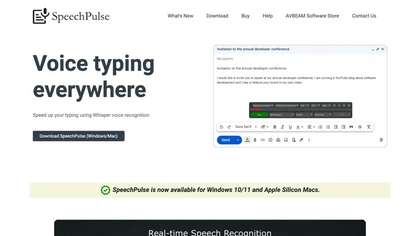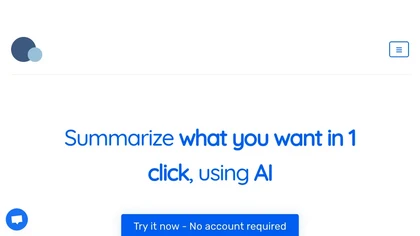AI use cases for Reading
Generative AI can be applied in various applications for reading. Here are some examples to explore below for inspiration with AI tools to get you started with using AI in reading.
🛠️ 70 AI tools for Reading
Explore a dynamic list of some of the most popular tools to get you started with various AI use cases and applications for Reading to streamline your workflows and productivity today.
Text Reader features
- Text-to-speech generation
- Realistic AI voices
- High-fidelity WaveNet voices
- Download voice audio in mp3 format
- Multilingual natural voices
NaturalReader features
- Text-to-speech conversion
- Variety of voice styles
- Multiple language support
- Online app availability
- Mobile app availability
- Chrome extension availability
- Accessibility features for individuals with learning disabilities
Text Reader AI features
- Text-to-Speech Generation
- High-fidelity WaveNet voices
- Download audio in MP3 format
- Support for over 40 languages
- Versatile use for personal and commercial projects
Tooltips AI features
- Text reading
- Text understanding
- Language support
- Free extension
- Pdf support
Free Text-To-Speech features
- Text-to-speech conversion
- Voice selection
- Language selection
- Style customization
- Donation support
Clipboard TTS features
- Clipboard scanning
- Text-to-Speech functionality
- High-quality natural voices
- Dyslexia-friendly features
- Auto-translation capabilities
🔥
Create your account, save tools & get personal recommendations
Receive a weekly digest of our handpicked top tools.
Unsubscribe anytime
tts4free features
- Supports multiple languages for text-to-speech conversion
- Integration with tts4free.com for easy conversion
- Input text content for conversion
- Selection of desired voice for conversion
- Powered by NextJS Edge-TTS technology
Textalky features
- 140 Languages & Accents Support
- 900 Lifelike Voices - Male & Female Choices
- Enhance Audio with SSML Tags
- Sound Studio Panel for Audio Editing
- Versatile Audio Export - MP3, Ogg, Wav, Webm
AIby.email features
- Text generation
- Grammar correction
- Summarization
- Custom story generation for children
- Study plan creation
AI Text Assistant features
- Text summarization in preferred language
- Utilizes GPT-4 technology from OpenAI
- Automatic comment generation
- Customizable settings for text length and summary ratio
- Applicable to various user types: content creators, writers, students, academics, marketers, journalists, business analysts, educators, and teachers
StoryWiz features
- Transforms text articles into visual stories
- Generates concise AI-powered summaries
- Offers thousands of unique designs for visual stories
- Provides personalized story feed based on individual interests
- Enhances reading productivity and learning efficiency
SpeakPerfect features
- Audio conversion
- Multi-language support
- All-purpose package
- Collaboration in chat community
- Rewards for referrals
Text-Generator features
- Text generation
- Content analysis
- Prediction of human reactions
- Research assistance
- Text classification and clustering
- Code generation
- Translation
- Tone and voice change in generated text
- Api endpoint
- Bulk generation capabilities
StoryLang features
- Customizable story generation
- Text and audio output
- Vocabulary expansion
- Personalized enhancements using OpenAI API
- Credit-based story generation
TTS-Generator.com features
- Support for a range of text formats
- Exclusive Pro feature for premium voice speeches
- Multilingual support for over 50 languages with diverse accents
- Copyright ownership of audio files for commercial purposes
- Plagiarism-free content using advanced AI technology
Voice to Text features
- Transcribe voice notes
- Summarize content
- Refine content
- Create various projects
- Operates locally for privacy
Leelo features
- Text-to-speech conversion
- Customizable languages and accents
- Cloud storage for generated speech files
- Embeddable widget on websites
- Dashboard for monitoring usage and quota
Texttovoice.online features
- Access to 500 guest emotions
- History tracking of 500 files
- Upgrade text to voice functionality
- Voice cloning capabilities
- Multi-voice feature
Text2Audio features
- Text-to-speech (TTS) functionality
- Divides long text into smaller sections
- Adjustable speech settings (pitch, speed, volume)
- Support for a wide range of languages
- Utilizes Google's text-to-speech API for efficient conversion
Speechki features
- Voice generation
- Text-to-speech conversion
- AI audiobook generation
- Real-time proof-listening
- Nuanced speech control
Beeyond AI features
- Voice-to-text conversion
- Art studio functionality
- Pdf document chatbot
- Social media optimization
- Travel planning assistance
- Nutritional recipe creation
- Book and movie research
- Productivity tools
- Legal assistance
- Multilingual support
- Organization and content categorization
- Up-to-date information access
Text Assistant features
- Text generation
- Prompt creation
- Symbol prompt addition
- Output copying
- Time-saving
Textie AI features
- 24/7 availability
- Text generation for ads, articles, emails
- Chat AI support
- Presentation creation
- Speech-to-text conversion
AutoTextGenie AI features
- Seamless integration into popular browsers and writing tools
- Leverage the power of GPT-3 and GPT-4 technology
- AI translation feature for text translation into multiple languages
- Customizable commands for tailoring the tool to specific writing needs
- Advanced AI assistance for generating personalized text and improving writing quality
SnackzAI features
- AI-powered book summary tool
- Provides book summaries in text and audio formats
- Diverse library covering various genres and topics
- Allows users to request their preferred voice for audio summaries
- Partners with authors and publishers
Letterly.app features
- Speech-to-Text Transcription
- Multi-language Support
- Powerful AI Writing Enhancement
- Voice Recording with Rewrite Options
Writers Brew features
- Writing
- Editing
- Ocr
- Text extraction
- Image conversion
AudioNotes features
- Voice notes to text
- Organization
- Transcription
- Summarization
- Content generation
AdutorAI features
- Speech-to-text conversion
- Text customization
- Summarization
- Translation capabilities
- AI-powered text enrichment
ttsMP3.com features
- Text-to-Speech conversion
- Support for over 28 languages
- Download speech in mp3 format
- Option to choose from multiple voices and accents
- Customizable parameters like speed, emphasis, and pitch
soundoftext.app features
- Text-to-speech conversion
- Access to 840 voices across 135 languages and dialects
- User account registration for unlimited conversion features
- Seamless conversion process without the need for logging in
- Wide range of high-quality voices available
Readingclub features
- Transform bedtime stories into interactive adventures
- write books
- Ability to illustrate, edit prompts, and change images
- Support for multiple languages.
Big Speak features
- Text-to-speech
- Speech-to-text
- Voice cloning
Speak4Me - Text to Speech features
- Convert text files (pdfs and websites) into audible content
- Listen to web pages
- Listen to pdfs, ebooks, and text files
- Upload text files from icloud, dropbox, or google drive
- Ask questions about a file and get detailed answers and concise summaries instantly
Narrator: Audiobook Maker features
- Free audio text reader
- Support for multiple formats
- Adjustable reading speeds
- Ability to create and convert audiobooks
- Save and share created audiobooks
Text Summarizer AI features
- Text summarization
- Advanced AI technology
- Analysis of sentence structures, word frequencies, and contextual relevance
- Ability to distill key themes and arguments
- Option for premium features through paid plans
WonderAI features
- Rewrite content
- Check for spelling errors
- Receive explanations
- Fine-tune writing
- Translate text
Speechnow features
- Text-to-Speech conversion
- Wide range of language options
- Variety of voice options (male, female, child)
- SSML features for enhanced customization
- No need for logging in
VoiceType features
- Voice-to-text conversion
- Automatic punctuation
- Formatting
- Spelling correction
- Saving of drafts
MicroMusic features
- Web-based tool
- Text summarization
- Key information extraction
- Natural language processing techniques
- Reading and research process optimization
LanguageTool features
- Grammar checking
- Spelling checking
- Style checking
- Punctuation checking
- Paraphrasing
Childbook features
- Create customizable stories
- Generate original characters
- Add illustrations
- Customize plots
- Text-to-speech
Audio Writer iOS features
- Simplify turning stream of thoughts into written text
- Capture and transform spontaneous ideas into writing
- Refining transcripts and rewriting text in various styles
- Generating content in multiple languages
- Seamless integration with Typefully and Reflect
SumsItUp! features
- Summarization of text and web links
- Translation of content from 90 languages
- Customizable summaries with modifiers
- Ability to present summaries in various formats (paragraphs, lists, poems)
- Suitable for a wide range of users including educators, analysts, privacy advocates, social media influencers, and business professionals
VoiceBar features
- Cutting-edge AI text-to-speech (TTS) tool
- Wide selection of realistic voices in over 80 languages and accents
- Premium voice quality subscription for unparalleled realism
- Caters to a range of use cases such as voicemail, content creation, and education
- Exclusive collection of voices aiming for indistinguishable human-like quality
Clearly Reader features
- Advanced text-to-speech features
- Reader mode for focused content consumption
- Cloud clipping capabilities
- Adjustable themes, fonts, sizes, and colors
- Quick translations
Transcriptal features
- YouTube transcription in over 100 languages
- Speech-to-text conversion without registration
- Advanced AI technology for precise transcriptions
- Generation of accurate summaries
- Trusted by prominent brands in the AI industry
Speech-to-Speech features
- Real-time speech conversion
- Natural-sounding speech
- Various applications
- Easy integration
- Low latency voice conversational experiences
- Dynamic dialogue creation in games
- Thousands of personalized audio ads in seconds
- Ethical usage guidelines
Revrite features
- Paraphrasing
- Language support
- Content editor
- Mobile compatibility
- Customization
Speechelo features
- Generate voice
- Text-to-speech transformation
- Customizable voice
- Multi-language support
- Video creation integration
Immersive Translate features
- Translate foreign language websites
- Translate PDF documents
- Translate ePub ebooks
- Support for multiple artificial intelligence engines like ChatGPT and DeepL
- Innovative segment-by-segment translation mode
article2audio features
- Enhanced understanding of English articles and blog posts
- Synthesizes complex text including programming code and tables
- Provides key takeaways without overwhelming details
- Offers meaningful voice-overs for enhanced listening experiences
- Supports English with plans to expand to other languages
Shakespeare features
- AI-powered writing assistant
- Full support for Google Docs
- 7 AI shortcuts
- Rephrasing text
- Fixing grammar and spelling errors
Tutur features
- Detailed insight into fluency progress
- Multiple practice scenarios
- User-friendly interface
- Speech analysis
- Progress tracking
summariesbooks features
- GPT-3.5 and GPT-4 integration
- Book summaries generation
- Mind map generation
- Online book reading
- Chat feature for interacting with a book robot
TextCortex features
- Text summarization
- Paraphrasing
- Ai-generated templates
- Multiple language support
- Platform integration
TextSynth features
- Translate
- Complete text
- Generate text
- Customize options
GoVoice features
- Voice-to-text conversion
- Text-to-speech capability
- Content generation for blog posts, social media updates, and newsletters
- Recycling existing content
- Enhanced productivity and efficiency
Beepbooply features
- Text-to-speech
- Voices
- Languages
- Audio-content
- Download
Sprinkle features
- Story generation
- Personalization
- Unique tales
- Adventure
- Ai technology
AiVOOV features
- Text to Speech online editor with instant conversion
- 1000+ voices in 150+ languages and accents
- Ability to create multi-voice conversations
- SSML support for fine-tuning speech output
- Multiple input options for text creation
Speechify features
- Listen to text documents
- Listen to pdfs
- Listen to web pages
- Customize voice
- Adjust audio speed
Tosummary features
- Webpage text extraction
- Youtube video subtitle extraction
- Content splitting
- Mobile compatibility
- Fast and reliable
WhisperUI features
- Converts audio files to text with high accuracy
- Supports multiple languages such as English, Spanish, French, German, and Chinese
- Recognizes various file types like mp3, mp4, mpeg, mpga, m4a, wav, and webm
- Can handle diverse accents, background noises, and technical jargon
- Provides a seamless web app experience for quick transcription
Xtool AI TTS features
- Ai-generated articles
- Text to speech conversion
- Edit content
- Select voice roles
- Generate audio results
- Adjust voice speed and volume settings
- Repurpose text based content
- Improve accessibility
Glimpse
5Glimpse features
- Chat assistant
- Seamlessly integrates with browser
- Conversational, writing, and editing assistance
- Adblock
SpeechPulse features
- Whisper speech recognition technology
- Real-time speech-to-text conversion
- Multiple language support
- Translation services
- Transcription and translation of audio files
AI Alfred features
- Summarize articles
- Summarize online text
- Save summaries
- Edit summaries
- Share summaries
